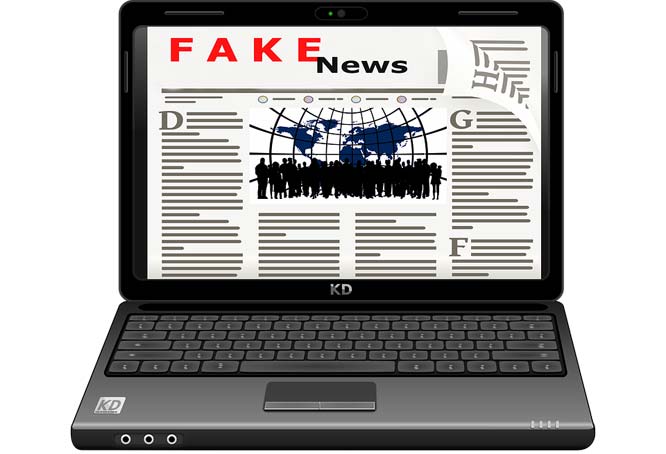
Our political class and their like-minded allies in the major media and Big Tech love to pretend that they're protecting us from misinformation and disinformation. What they've actually been doing is preventing the public from knowing the truth, while they are the ones spreading lies.
This is a deliberate and calculated strategy to entrench their own political and economic power.
Here's how it works: They disseminate lies that become the official "narrative." When others raise questions, point out facts that controvert that narrative or attempt to bring the truth to light, that truth is called "misinformation" or "disinformation." Those who challenge the narrative are smeared as liars, kooks and conspiracy theorists. And when that fails to stop the truth-tellers, the social media companies (Facebook, Twitter, YouTube and others) shadowban them, hide their content under false "warnings" or kick them off the platforms outright.
This has happened countless times.
Former President Donald Trump claimed that he was spied on. Democrats called these accusations hysterical lies. But John Durham's methodical investigation has produced information proving not only that Trump was spied on but that members of Hillary Clinton's campaign paid internet experts to fabricate evidence showing that Trump had a server directly connected to Russia. Clinton's team lied to the FBI. The FBI and the CIA knew that the evidence — including the infamous Steele dossier — was wholly incredible. And yet the FBI lied to the Foreign Intelligence Surveillance Court to get surveillance warrants. Further, the Clinton campaign had funneled money through law firm Perkins Coie to spy on contractor Fusion GPS (which concocted the dossier), and then lied that the payments were for "legal services," in violation of campaign finance laws.
These fictions and the abuse of power that animated them were drummed up to support Clinton's and the Democrats' lies that Trump's victory in the 2016 presidential election was obtained by colluding with Russia, to undermine his presidency and cripple his administration with the multimillion-dollar "Russia collusion" investigation that, unsurprisingly, produced no evidence of collusion.
The COVID-19 pandemic has produced enough official disinformation to fill volumes. The lab leak origin theory of the virus was condemned as misinformation, as was data showing that drugs like ivermectin and hydroxychloroquine could be used to successfully treat the disease. It was forbidden to point out the damage done by masking children all day long, or the utter futility of economically devastating lockdowns. Anyone pointing to data showing links between the Pfizer and Moderna vaccines and heart issues was shouted down.
Damning information and photos found on Hunter Biden's laptop in late 2020 were quickly denounced as "Russian disinformation," and all reporting on it was blocked by the social media companies for the sole reason that it cast a very unfavorable light on his father, Joe Biden, during the last days leading up to the 2020 election. Now, with the election 17 months behind us, we're told that the laptop is Biden's.
Convenient.
Last week at Stanford University, former President Barack Obama offered one of his characteristically gaslighting speeches in which he intoned solemnly about the dangers of disinformation: "You just have to raise enough questions, spread enough dirt, plant enough conspiracy theorizing, that citizens no longer know what to believe."
Are those warnings? Or instructions? After all, Obama is a disinformation pro. Years ago, he bragged to author Richard Wolffe, "I actually believe my own bulls—t." He lied to the American public about his truly terrible deal that gave Iran billions and let them pursue their work toward a nuclear bomb. (Obama's Deputy National Security Adviser Ben Rhodes infamously laughed and preened about this particular deception.) Obama's signature legislative achievement, the Patient Protection and Affordable Care Act, neither protects patients nor is affordable. Obama gave speech after speech in which he promised Americans that they could "keep their doctors" and "keep their plans" — lies so egregious that Politifact named them the 2013 "Lie of the Year." One of the bill's architects, Jonathan Gruber, admitted on camera that "lack of transparency" was necessary to pass the law, because of the "stupidity of the American voter."
So, the fear and loathing of disinformation only goes one way.
Nothing proves the perils of free speech more than the panic of the powerful at the news that billionaire Elon Musk has brought Twitter. That company has made its mark by constricting content that runs counter to the pet narratives of the Left, censoring conservatives and even kicking the former president of the United States off its platform (while terrorists and members of the Taliban are free to tweet).
It's abundantly clear at this point that when powerful people or the press wring their hands over "misinformation" or "disinformation," what they're really worried about is their loss of control over what Americans see, hear, read and believe.
That they deceived us for so long is shame on them. But if you still believe them after being lied to so often, shame on you.
(COMMENT, BELOW)
Laura Hirschfeld Hollis is on the faculty at the University of Notre Dame, where she teaches courses in business law and entrepreneurship. She has received numerous awards for her teaching, research, community service and contributions to entrepreneurship education.


 Contact The Editor
Contact The Editor
 Articles By This Author
Articles By This Author